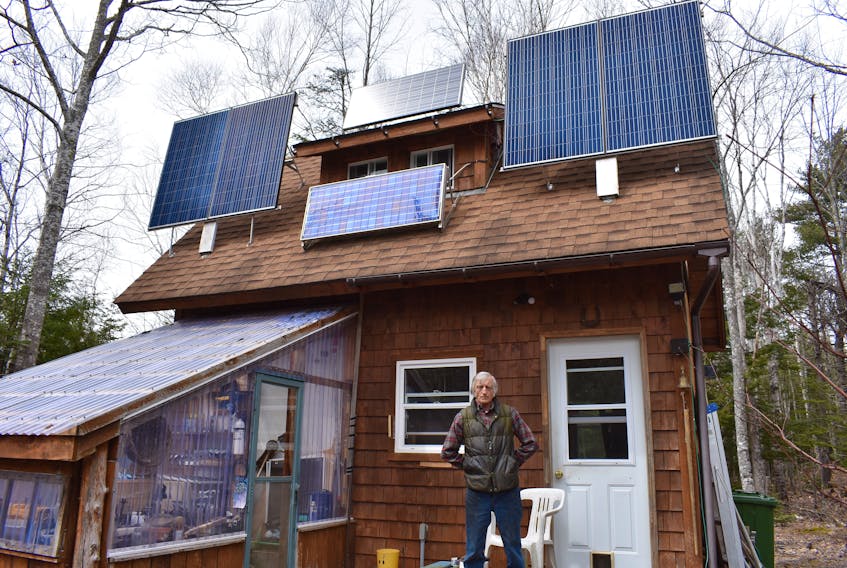WEST RIVER, PICTOU COUNTY
It’s been 15 years since John Patton last saw a power bill.
Instead, he points to the array of solar panels mounted on the roof of his modest cottage in the woods outside West River, a testament to his off-grid lifestyle.
The panels power up his lights and cellphone charger, while he draws his heat from chopped wood.
“I don’t owe anything on the system and I’ve never been without power, even in snowstorms or the worst weather conditions,” Patton told The News.
His story began in 2003, when Patton bought his 9.7 acre land parcel on West River East Side Road. Unlike neighbouring land plots, there was no power hookup at his property.
At the time, Patton worked as head gardener for the Town of New Glasgow and had experience in environmental design and land use planning for both municipal and provincial governments. He retired in 2007.
As such, he knew what he was getting into when he bought his first 100-watt solar panel around that time.
Patton forked out $800 for his first panel, working out to $8 per watt.
Going off-grid didn’t exactly come cheap 11 years ago, but since then, the price of solar panels has tumbled.
Two years ago, Patton upgraded his system with four more panels. The 260 watt units he purchased worked out to just under one dollar per watt.
Indeed, setting up the panel system on Patton’s cottage was quick and eco-friendly.
“I hired people to do it and the young fellow that put these up also lives off-grid and he used his green energy to build the mounting brackets and frames that hold them on the roof,” said Patton, referring to the Caribou River company Nova Sun Power.
The brackets themselves are made from recycled aluminum and the tools used to build them were solar-powered.
With his solar system up and running, Patton says the panels need no maintenance and are weather-resistant.
Panel owners do not even need to place them on the roof. They can be mounted on a ground rack anywhere that sunlight can reach.
“You can live on a mountaintop, on a cliff overlooking the ocean, or a wilderness area as long as you have a south-facing open sky – and the cost of unserviced land is usually cheaper as well,” said Patton.
The panels work by collecting solar energy and sending it to what is essentially a battery with a control unit. Electricity is fed into two circuits, one into a 12-volt network and another into a 110-volt system.
The 12-volt system coming straight from the battery is used for charging appliances such as phones and the house lights.
The 110-volt circuit uses electricity converted from the 12-volt system. It is used to run Patton’s high-speed internet, water pump and his 1,000-watt microwave.
However, Patton does not yet have enough solar power for his electric stove, heating elements or water heaters. For them, he uses wood.
Nonetheless, he was keen to promote his off-grid lifestyle to others.
And his advice to anyone thinking of following him was simple.
“Do it.”
The alternative is paying bills to an outside energy provider, which Patton was keen to avoid.
He said that remains the case even as Nova Scotia moves to clean energy such as wind power, as turbine plants are still hooked up to the grid.
Being prepared to move off-grid can help people save money, as well as buy cheaper land for their homes.
“It’s still a very small amount of people but I think it’s the future,” said Patton of living off-grid. “I think common sense is going to kick in one of these days.”
According to the National Energy Board, solar energy makes up just 0.5 per cent of all Canada’s generated electricity, as reported by the CBC last December.
This is despite the plummeting price of solar power, as witnessed by Patton when he bought his latest panels.
However, the NEB said that renewable energy is on track to replace coal, which Canada aims to remove as a source of electricity by 2030.









